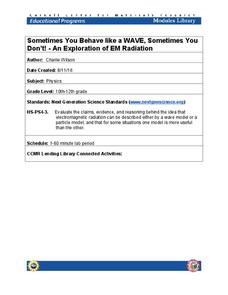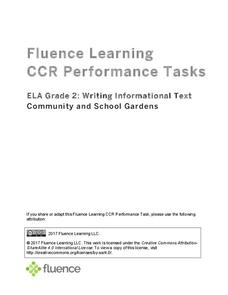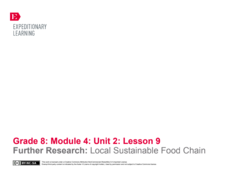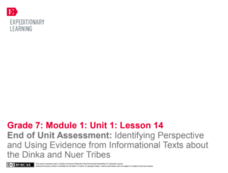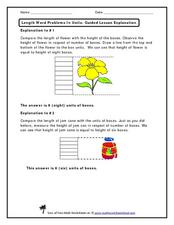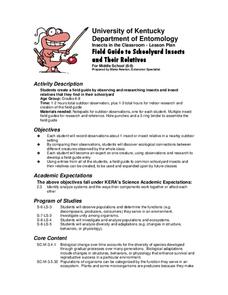Teacher Created Resources
How to Calculate Discounts and Sales
Teach discounts and sales with a straightforward learning exercise. After reviewing the concept, pupils solve word problems related to dollars and percentages. The second half of the sheet prompts learners to continue solving problems...
Curated OER
Animal Adaptations
Young scientists explore the animal kingdom from the safety of the classroom with this short research project. After first choosing an animal, children use the Internet to discover where it lives, what it eats, and how it...
Curated OER
Harry Potter and the Prisoner of Azkaban: Bloom's Taxonomy
Take a moment in your Harry Potter unit to assess comprehension. Readers use knowledge gained for the text and from their own experience to answer seven questions based on events in chapters four and five of Harry Potter and...
Classroom Law Project
Should we believe everything we read? Becoming a discerning consumer of media
Class members investigate the role media should play in a healthy democracy. As part of this study, groups analyze political advertising, use FactCheck to assess not only the veracity of but the persuasions techniques used in candidates'...
EngageNY
Recursive Formulas for Sequences
Provide Algebra I learners with a logical approach to making connections between the types of sequences and formulas with a lesson that uses what class members know about explicit formulas to develop an understanding of...
Cornell University
Sometimes You Behave Like a WAVE, Sometimes You Don't!
Electromagnetic radiation behaves like both a wave and a particle. Help classes explore this concept through a lab investigation. Young scientists create optical interference patterns on a glass slide using a carbon layer. They analyze...
West Contra Costa Unified School District
Law of Sines
One must obey the sine laws. A lesson introduces and derives the Law of Sines for non-right triangles. With examples that use the Law of Sines to determine unknown measures in triangles, the lesson checks to see if the Law...
Chymist
Earth Science
Explore the consistency of the earth's layers and soil through modeling. By conducting an engaging experiment, learners develop a model for the earth's layers and a soil profile using edible materials. Each material is chosen based on...
Fluence Learning
Writing Informational Text: Community and School Gardens
Two informational texts feature community gardens of the past and present and how seeds grow. Scholars read, discuss what they have read, complete a timeline, define words, and compose a brief essay about the texts' main idea.
EngageNY
Analyzing Text Structure: “Generation Z Stereotyped”
Breaking the stereotype. Readers use the Generation Z Stereotyped Structure anchor chart and find the central idea of the text. They then read Generation Z with partners and discuss the text using guiding questions. Finally,...
EngageNY
Using Details to Determine Theme: The Myth of Cronus
There's nothing like a good theme! After reviewing the story of Cronus, learners participate in a mini instructional activity about theme by pulling papers from an envelope and identifying the writing on it as either a topic or a...
Primary Resources
8mm Handwriting Template
It's a handwriting template that is perfect for intermediate learners; the smaller size allows for practice in using regular lined paper. However, it offers a dotted middle guideline to help remind writers about spacing and letter...
West Contra Costa Unified School District
Law of Sines
Laws are meant to be broken, right? Learners derive the Law of Sines by dropping a perpendicular from one vertex to its opposite side. Using the Law of Sines, mathematicians solve for various parts of triangles.
K20 LEARN
Active Or Passive?—"The Monkey's Paw": Grammar/Language Usage
Don't you wish you could use passive voice? Be careful what you wish for! "The Monkey's Paw" is the focus of a grammar and language usage lesson about active and passive voice. Readers identify examples of active and passive voice in...
EngageNY
Further Research: Local Sustainable Food Chain
Researchers review how to create citations, find reliable sources, and paraphrase. Next, using guided task cards and their researcher's notebooks, they investigate the question they developed in instructional activity eight about the...
EngageNY
End of Unit Assessment: Identifying Perspective and Using Evidence from Informational Texts about the Dinka and Nuer Tribes
Pupils consider the varying perspectives of people in different cultural groups as they read an informational text about the Dinka tribe of Southern Sudan and complete graphic organizers. They also respond to a constructed-response...
EngageNY
Using Multimedia in Presentations: Preparing to Present Claims
Eye contact, volume, pronunciation are all parts of a great presentation. Scholars create visual displays to clarify the claim for an upcoming presentation about whether the American Academy of Pediatrics should increase its screen time...
Curated OER
Length World Problems in Units - Guided Lesson Explanation
Rather than a worksheet, this teacher resource is a one-page, scripted answer sheet for a guided lesson on length word problems. First graders are asked to compare the length of a flower and a jar of jam with a number of unit boxes....
Curated OER
Anticipation Guide for Death of a Salesman
"It is better to ignore something unpleasant than to face reality." Readers of Death of a Salesman complete an anticipation guide before tackling Arthur's Miller's tale of Willy Loman and his sons. After completing the play, class...
Curated OER
Field Guide to Schoolyard Insects and Their Relatives
Your entire class works together to create an illustrated insect field guide. The intent is that they venture outside of the classroom, find a critter, and then research it using reference materials, insect books, and the Internet for...
Curated OER
Using Word Processing to Create Graphic Organizers
Students create a graphic organizer and instructional rubric using word processing software. They conduct Internet research at the History Alive website, and publish an essay.
Curated OER
Nothing But the Truth: Anticipation Guide
“What does it mean to be patriotic?” “Should grades factor in to a student’s eligibility for extracurricular activities?” Class members complete an anticipation guide that asks them to respond to a series of statements that highlight...
Curated OER
Edit Essays with Word Tables
Students examine how to identify grammar and spelling errors in an essay using the features of Word after the teacher uses the highlight feature. They correct the errors using Word's table feature by making a table that shows the error...
Curated OER
Economics Study Guide
Use this resource as a basic review of economic principles. There are six questions relating to the factors of production, opportunity costs, wants and needs, tangibles and intangibles, and more.





